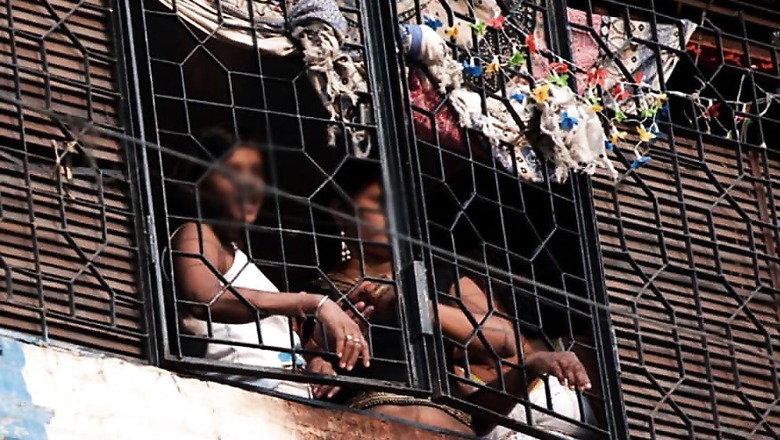
views
They are finally living with their children. Normally, or for the lack of it, they reside in separate buildings where men come by the dozen throughout day and night. They are commercial sex workers in New Delhi's biggest red light area, Garstin Bastion Road, popularly known as GB Road.
But they are mothers first. Due to social distancing rules and a strict curfew, COVID-19 lockdown has united them with their sons and daughters for the first time in years.
Tucked away in a place otherwise thronged by the lust for flesh, there is a small, happy home for children aged 14 years and less. Completely unaware of what their mothers do and who their real fathers are, these children stay in an NGO-run shelter home, attend school and learn basic life skills, away from, what they could have called, family.
The shelter home, adjacent to 78 brothels where 2,225 women stay, is run by 54-year-old Lalitha Nayak who has spent half her life going from one brothel to another, convincing mothers involved in sex trade to educate their children.
It was in 1991, with some support from the government, that she was able to start the day-care centre with five children in a room for which she had to fight hard with the municipal authorities.
Before the lockdown, Durga, 13, did not remember her mother's name. She only saw her twice a month for a few minutes. She has grown up in the shelter home, SPID SMS Centre, with 70 other children.
She moved in with her mother more than a month ago — after 10 years. Thirteen children have shifted with their mothers ever since the nationwide shutdown.
However, the unison has come at a cost. There have been no clients ever since the imposition of lockdown on 24 March. "We have lost our only source of income. It is such a weird dilemma. I have my daughter but I have no money," said Durga's mother.
On April 8, the Global Network of Sex Work Projects and UNAIDS released a statement highlighting the hardship and discrimination faced by sex workers in this time, urging countries to ensure that their human rights be respected and fulfilled.
"Whenever and wherever possible, sex workers are responsibly self-isolating in response to governments' calls. However, when they are excluded from COVID-19 social protection responses, sex workers are faced with putting their safety, their health and their lives at increased risk just to survive," the statement read.
Women here have mostly been surviving on donations by local NGOs. Most of them have no Aadhaar and ration cards and are not enlisted in any government-funded schemes.
Last month, the Centre announced a package worth Rs 1.17 lakh crore for the poor, which is of no use to them.
Sex work in India is governed by the Immoral Traffic (Prevention) Act, 1956. It is currently illegal to solicit sex sale in public and to organise commercial sex.
According to local activists, the women here are daily-wage labourers and make anywhere between Rs 50 to Rs 1,000 per person. The clientele consists of mostly construction workers, rickshaw-pullers, truck and auto drivers among others who themselves have found no work ever since the lockdown was imposed.
Activists said sex workers have negligible savings and mostly no bank accounts. After no food, their next fear is being driven out of their accommodations. Most of them pay a cut per customer as rent and have nowhere to go in the city.
Most women are from rural and lower caste backgrounds, living in inhumane conditions crammed in dingy rooms of dilapidated buildings. They are usually brought to the city by traffickers on the pretext of good jobs and are sold to local middlemen.
A public interest litigation has been moved in Delhi High Court seeking direction to Centre and Delhi government, to take effective steps for social security and welfare measures, including food, accommodation, and medicine for sex workers and the LGBT community. The petition also seeks constitution of a committee for the sex workers.
The petition stated that sex workers and the LBGT community do not have access to financial aid during lockdown.
Petitioner and lawyer Anurag Chauhan said the Delhi government and Centre are deviating from their aims and objects of providing basic financial aid.
However, these women are not bogged down by the crisis. A small group of workers collect groceries from all the local NGOs and distribute it among themselves. They share to ensure nobody stays hungry.
"We provide milk and other essentials. On some days, if we don't have volunteers, women come themselves to collect the necessary items. They are helping each other to get past this crisis because nobody has been visiting this area," said Awdesh Yadav, convener of SPID SMS Centre.
Meanwhile, back in the leaky room where Durga is living with her mother, there is hardly any evidence of the gloomy pandemic. She is well-fed and away from the battles her mother fights every day.
"I collect food in the morning and evening while Durga waits in the room," she said. In the evenings, the mother-daughter duo watch TV, play ludo and talk to their hearts content.
Durga is getting to know her mother for the first time in 13 years. She has stories of the shelter home to tell her -- about who her friends are, how she spends her day and what she learns in school.
However, she has limited time. Durga will be back in the centre after the lockdown is lifted and economic activity resumes. Her mother will have to tend to her clients.















Comments
0 comment